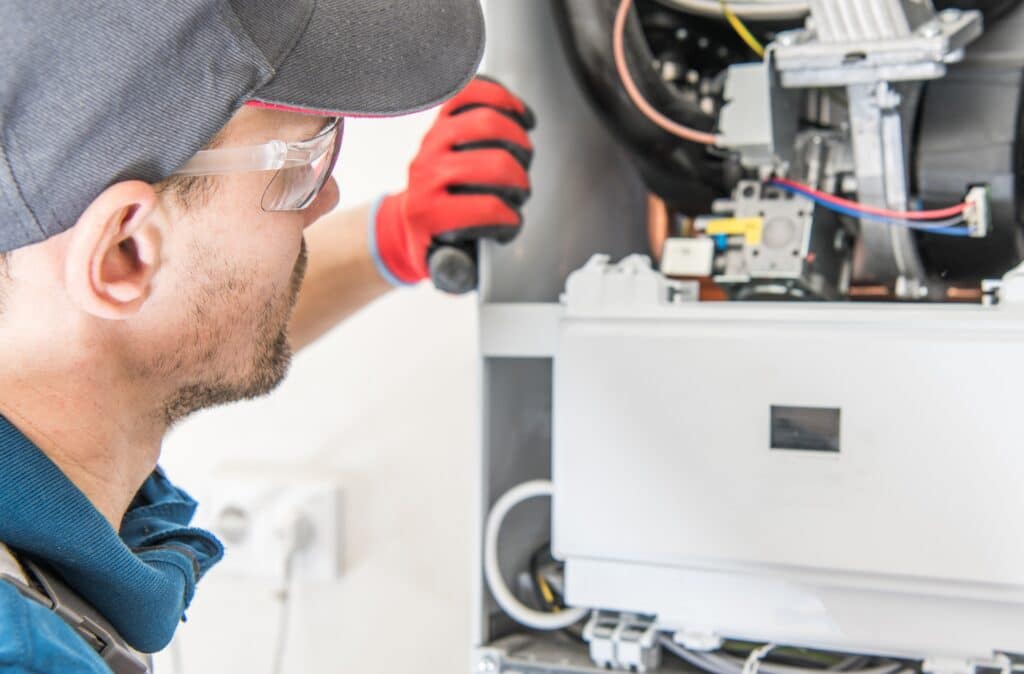
The days are getting colder, which means your furnace in Denver or the surrounding area is going to be used more and more often over the coming weeks.
The more you rely on your furnace to keep you warm, the more wear and tear you’re going to put on the system and the more likely it will be for problems to develop.
Quick reaction time is very important when it comes to treating problems with your furnace. So, let’s take a look at some furnace problems you should be aware of and when to call in Denver heating repair services from the pros.
Of course, if you have any questions, or need help with your furnace, reach out to the Denver heating experts at Bell Plumbing, Heating, Cooling & Electrical!
Short-circuiting is when your furnace turns itself on and off every few minutes. The typical cause of this is heat buildup in the furnace plenum, which leads to the system overheating and shut itself down. After cooling off sufficiently, the furnace starts up again, overheats again, and shuts down again. This cycle continues until the core problem is dealt with. If the furnace continues to short-cycle, it will wear down significantly faster than it otherwise would. This will shorten its lifespan by a number of years. Call for repairs as soon as you hear your furnace short-circuiting.
The air handler is the part of the furnace that circulates air throughout the house during operation. The air handler is placed under a lot of strain during operation, and though it does have countermeasures in place, they do not make it immune to issues. If the air handler starts to malfunction, the furnace will be unable to properly distribute air during operation. If you can’t seem to get any air blowing from your furnace, it may be because of a bad air handler.
Low air flow coming from your furnace usually results from a blocked air passage or a problem with the fan. You end up forcing the system to work harder, which can leave hot air trapped in your furnace.
A lack of heating maintenance, frozen coils, a faulty motor, leaking ducts, or dirty filters are just a few reasons why you may struggle with low air flow. If you’ve always had low air flow, your HVAC system or furnace may also be the wrong size or installed incorrectly. The team at Bell can help identify the problem and give your HVAC a thorough inspection to make the most of your system this winter.
There’s nothing worse than continuing to crank up your thermostat and not getting the heat you deserve. Anything, from clogged burners to duct breaches, can result in low heat levels. You may also have incorrect thermostat settings, clogged or dirty air filters, pilot light problems, fuel supply issues, and more. As with low air flow, that usually forces the furnace to work harder than it should.
If you notice your energy bills are on the rise during the winter months, it could point to a wide range of problems. Your furnace may be at the end of its life span and need an upgrade or more efficient unit. Faulty thermostat settings and a lack of maintenance can all contribute to skyrocketing energy bills.
There are also issues unrelated to your furnace that could cause energy consumption spikes, including a problem with your hot water heater. We can help with both! Call the team at Bell Plumbing, Heating, Cooling, and Electrical to resolve the problem and restore the warmth of your home.
If you hear noises that you don’t associate with your heating system’s normal ability to function, you could have a problem with your furnace. That can include anything from bumps to groans to whistles. In most cases, they start and stop in time with the furnace.
If you have a combustion furnace (one that uses natural gas, propane, or oil), you have a burner assembly that includes either a standing pilot light or an electronic igniter. Different problems can develop with the ignition process, such as broken thermocouples or dirt clogging the nozzle, and these will lead to issues with igniting your furnace.
The inside of your furnace holds a very important component called the heat exchanger. This component allows the heat for your home to be generated on the outside of it while funneling the toxic combustion products directly to your furnace’s flue for expulsion. If there is a crack of any size in the heat exchanger, the toxic byproducts can leak into your home’s indoor air, creating a serious hazard for you and your family.
A sizable fan, also referred to as the blower, is how your furnace transfers heat to the interior spaces of your home. If problems develop with any components of the fan assembly, there can be issues with the warm air being blown into your home.
Trouble from your heating system rarely arrives unannounced. While some issues result in a sudden shutdown—usually due to a safety concern such as leaking gas or because of imminent danger to some component in the system—many will advertise themselves with subtle signs that something is wrong. This is the time of year when those signs often make themselves apparent. You can spot them if you know what to look for.
Frankly, anything that you don’t recognize as part of your furnace’s normal ability to function should be cause for concern. And you should never attempt to diagnose or repair a furnace yourself. Instead, if you spot the signs of trouble, turn the system off and summon a repair service immediately.
Bell Plumbing and Heating provides comprehensive furnace repair services throughout Denver, CO. If you need furnace help of any kind, call today to schedule an appointment with one of our experts.
We’re ready to answer your questions or schedule your appointment, call now or book online!
